Dr. Andrea Perino - Radically positive PhD support
Coaching and Training for the Science Leaders of the Future
Career Clarity | Visibility | Sustainable success


Featured in

For the PhD students of today it is no longer sufficient to be a great scientist. If they want to move on to successful careers they need to be excellent project managers, science communicators, and leaders, too.
After 10 years as researcher, policy expert, consultant and founder, I know what skills you need to design and lead a successful project, and to create results that make a difference - in science and society, and for your career.
As trainer and certified coach, it is my mission to equip young scientists with those skills and to empower them to create and share research to advance science, create solutions for pressing societal problems, and boost their individual careers.
Courses
I offer workshops at universities, online courses and individual coaching to support grad students at every step of their journey.
Whether they just started their PhD or are about to submit the thesis, whether they want to succeed in their academic career or thrive in industry - I have the right course for them.

Start-up your PhD
Starting a PhD is overwhelming. How do you break the immense work load into manageable tasks and milestones? How do you manage the available time and resources so you finish on time and stay healthy? What to do when things go wrong?
In this 1-day workshop, new PhD researchers learn key skills to tackle these new challenges and lead their project to success.
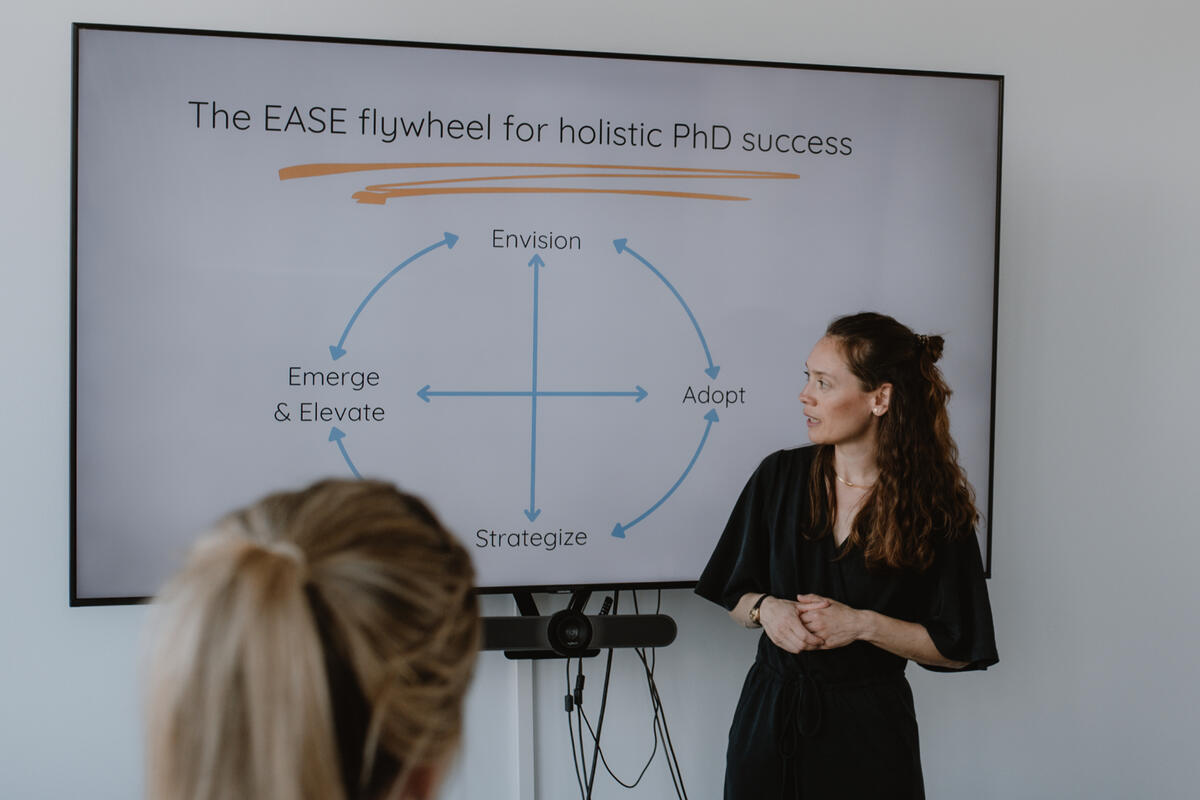
Your Pathway to Impact
As scientists, we are increasingly expected to make an impact. But what does that even mean? And where can we engage and contribute to society?
In this hands-on 1-day workshop, participants develop their personal pathway to impact, going from ideation, to understanding their target group, to outlining their first action step.

Networking for ECRs
In today's digital age, becoming visible online is crucial for scientists to disseminate their research, collaborate with peers, and advance their careers.
This 2-day workshop equips participants with the essential skills to build, grow, and leverage their professional network, both in person and on social media.

Scientific Presentations - Getting your message across
The best research is useless if nobody knows about it.
This 1-day course will provide participants with the essential skills and techniques to create compelling, clear, and impactful presentations that effectively communicate their research to peers and researchers across disciplines.
Participants will learn how to structure their content, tell a story with data, design engaging visuals, and deliver their message with confidence.
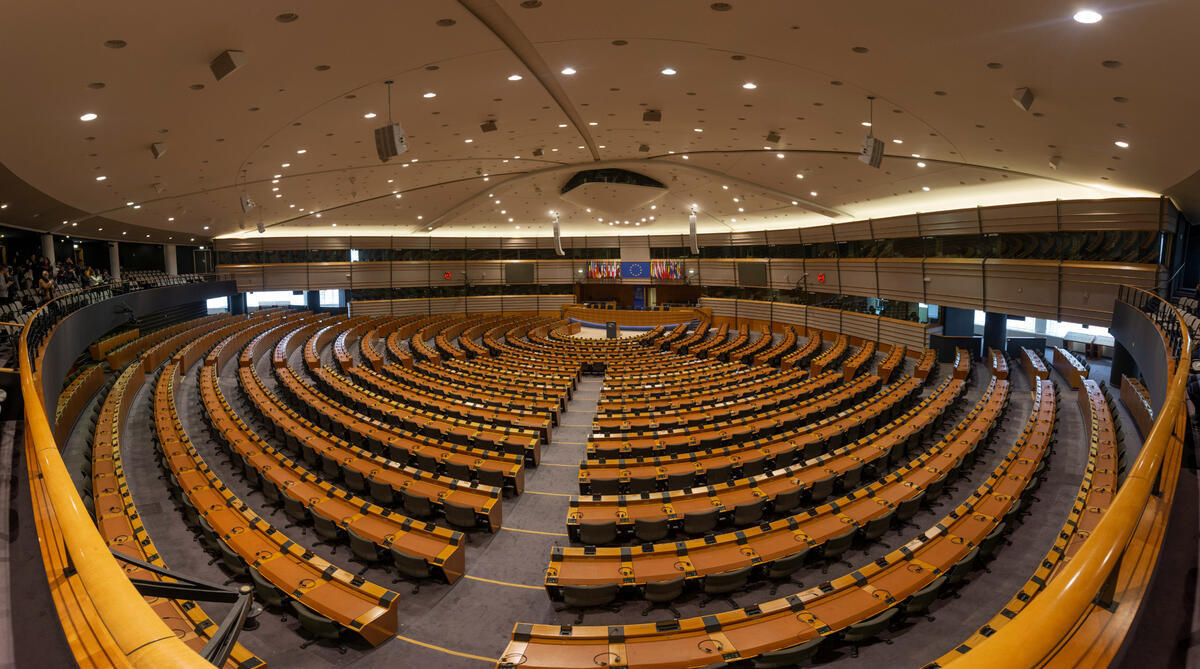
How to write a policy brief
In this workshop, participants will get an introduction to the world of policy-making, learn what decision makers need to know from scientists, and how to contribute such information so it can be taken up in policy processes.While drafting their own policy brief participants will learn how to extract key messages and develop policy recommendations, and how to translate scientific jargon into a language policy makers can understand.
Ph*ing Do it!
Many PhD candidates struggle to write up the thesis. But it doesn't have to be so hard. All that's needed is this:
• A strategic plan for the final months
• Accountability to stay on track
• Support and someone to cheer us on.
Just (Ph)Do it! is a 90-day online challenge that provides all that.
• 1 kick-off week to create a personal finisher's plan.
• Weekly group-coaching.
•Individual coaching on demand.
(Click on image to learn more)
Want to know the details?
Participants' Feedback
"I really enjoyed the workshop Andrea. I particularly liked the room you gave us to discuss and interact. I like the structured sheet that we could fill in during the course. I think everything was well structured and educational of what it needs to make an impact."
"I have done several other similar courses on management in the past, but I still learnt some new, useful tips."
"Much enjoyed. Thought-provoking, engaging, and lots of useful information provided."
"Extremely effective!"
References
Universities
Albert-Ludwigs-University Freiburg
Leipzig University
Cologne University
Goethe-University Frankfurt
Freie University Berlin
Humboldt-University Berlin
Münster University
University Passau
University clinics
Charité
University Clinic Freiburg
University Clinic Leipzig
Coordinated programs funded by the DFG
German Centre for Integrative Biodiversity Research (iDiv)
iRTG ConFoBi (University Freiburg)
iRTG Hyp*Mol (University Leipzig)
iRTG AC3 (University Cologne)
Coordinated programs funded by the EU
COFUND "MIGRATION, DIASPORA, CITIZENSHIP" (MDC), University Münster
Coordinated programs funded by the BMFTR
FEDA: Initiative für den Erhalt der Artenvielfalt (Senckenberg Society)
Max-Planck Schools
Max-Planck School of Cognition
Max-Planck School Matter to Life
Helmholtz-Association
Max-Delbrück Centre for Molecular Medicine (MDC)
Get in Touch!
Want to know more? Leave me a message!
My journey
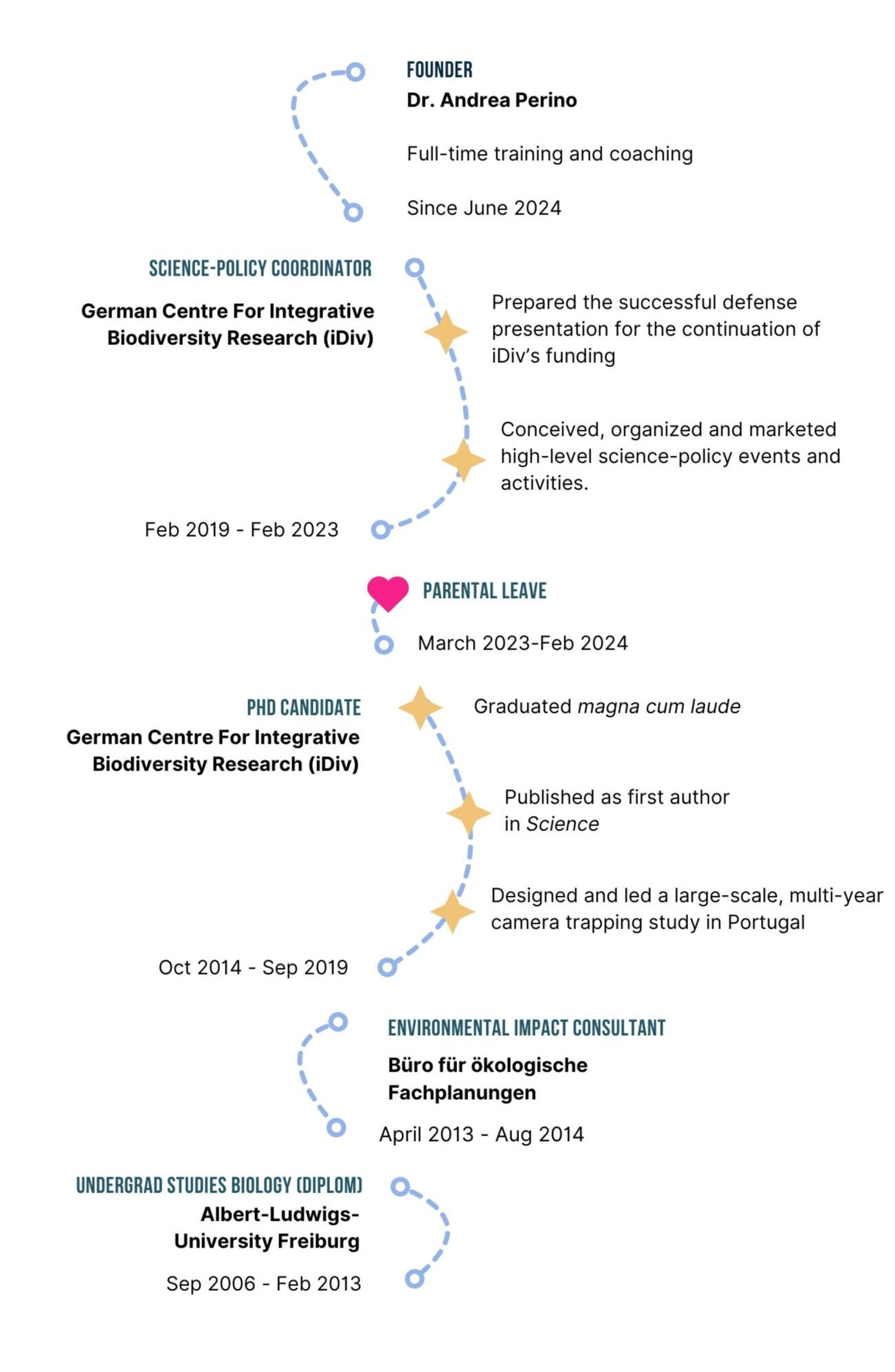
I received my PhD in conservation ecology from the Martin-Luther University Halle-Wittenberg in 2019.My research is published in high-impact disciplinary and interdisciplinary journals including Science and Conservation Letters and has been covered by a large range of broadcast media (e.g., BBC, WDR, Süddeutsche Zeitung, ARTE).From 2019 to 2024, I served as Science-Policy Coordinator of the German Centre for Integrative Biodiversity Research (iDiv) in Leipzig.
In this capacity, I represented iDiv in global biodiversity policy processes, developed and spear-headed an institution-wide policy strategy, advised national and federal state governments, planned and executed large high-level policy events, and supported scientists in presenting their research to both scientific and non-scientific audiences.Since 2021 I am certified as coach by the Coach Training Alliance (CTA).Dr. Andrea Perino - PhD Coaching and Training was founded in June 2024.
Imprint and Data Protection
Dr. Andrea Perino
Zschochersche Str. 10
04177 Leipzig
+49 (0)176/57852714
Haftung für Inhalte
Als Diensteanbieter sind wir gemäß § 7 Abs.1 DDG für eigene Inhalte auf diesen Seiten nach den allgemeinen Gesetzen verantwortlich. Wir als Diensteanbieter sind jedoch nicht verpflichtet, übermittelte oder gespeicherte fremde Informationen zu überwachen oder nach Umständen zu forschen, die auf eine rechtswidrige Tätigkeit hinweisen. Verpflichtungen zur Entfernung oder Sperrung der Nutzung von Informationen nach den allgemeinen Gesetzen bleiben hiervon unberührt. Eine diesbezügliche Haftung ist jedoch erst ab dem Zeitpunkt der Kenntnis einer konkreten Rechtsverletzung möglich. Bei Bekanntwerden von entsprechenden Rechtsverletzungen werden wir diese Inhalte umgehend entfernen.
Haftung für Links
Unser Angebot enthält Links zu externen Webseiten Dritter, auf deren Inhalte wir keinen Einfluss haben. Deshalb können wir für diese fremden Inhalte auch keine Gewähr übernehmen. Für die Inhalte der verlinkten Seiten ist stets der jeweilige Anbieter oder Betreiber der Seiten verantwortlich. Die verlinkten Seiten wurden zum Zeitpunkt der Verlinkung auf mögliche Rechtsverstöße überprüft. Rechtswidrige Inhalte waren zum Zeitpunkt der Verlinkung nicht erkennbar. Eine permanente inhaltliche Kontrolle der verlinkten Seiten ist jedoch ohne konkrete Anhaltspunkte einer Rechtsverletzung nicht zumutbar. Bei Bekanntwerden von Rechtsverletzungen werden wir derartige Links umgehend entfernen.DATENSCHUTZERKLÄRUNGName und Anschrift des Verantwortlichen:
Dr. Andrea Perino
Zschochersche Straße 10
04177 Leipzig
0176/57852714
[email protected]
www.andreaperino.comDer Verantwortliche im Sinne der EU-Datenschutz-Grundverordnung sowie sonstiger datenschutzrechtlicher Bestimmungen ist:WIR RESPEKTIEREN IHRE DATEN!
Wir freuen uns über Ihr Interesse an unserem Internetauftritt. Das Vertrauen aller Besucher und Kunden, die Sicherheit Ihrer Daten und der Schutz Ihrer Privatsphäre sind für uns von zentraler Bedeutung. Ihre personenbezogenen Daten werden von uns daher gemäß den gültigen gesetzlichen Datenschutzvorschriften und dieser Datenschutzerklärung behandelt. Personenbezogene Daten sind Informationen, die dazu genutzt werden können, um Ihre Identität zu erfahren, wie beispielsweise Ihr richtiger Name, Ihre Adresse oder Ihre Telefonnummer.
Wenn Sie unsere Seite ansehen und benutzen, ohne sich zu registrieren oder uns anderweitig ausdrücklich Informationen zu übermitteln, verarbeiten wir die Daten, die uns mit jeder Anfrage Ihres Browsers übermittelt werden (siehe unten „Protokoll-Daten). Sofern Sie uns ausdrücklich personenbezogene Daten übermitteln erfolgt dies ausschließlich zweckgebunden an die Anfrage bzw. den jeweiligen Auftrag. Wir weisen Sie darauf hin, dass die Datenübertragung im Internet nie vollständig gegen einen Zugriff durch Dritte geschützt werden kann.Nachfolgend möchten wir Ihnen näher erläutern, welche Daten wir wann und zu welchem Zweck verarbeiten. Es wird erklärt, wie unsere angebotenen Dienste arbeiten und wie hierbei der Schutz Ihrer personenbezogenen Daten gewährleistet wird.RECHTSGRUNDLAGE FÜR DIE VERARBEITUNG PERSONENBEZOGENER DATEN
Sofern wir für Verarbeitungsprozesse personenbezogener Daten eine Einwilligung der betroffenen Person einholen, dient Art. 6 Abs. 1 lit. a DSGVO als Rechtsgrundlage.
Für die Verarbeitung von personenbezogenen Daten, die zur Erfüllung eines Vertrages, dessen Vertragspartei die betroffene Person ist, erforderlich ist, dient Art. 6 Abs. 1 lit. b DSGVO als Rechtsgrundlage. Dies gilt auch für Verarbeitungsvorgänge, die zur Durchführung vorvertraglicher Maßnahmen erforderlich sind.
Sofern eine Verarbeitung personenbezogener Daten zur Erfüllung einer rechtlichen Verpflichtung erforderlich ist, der unser Unternehmen unterliegt, dient Art. 6 Abs. 1 lit. c DSGVO als Rechtsgrundlage.
Für den Fall, dass lebenswichtige Interessen der betroffenen Person oder einer anderen natürlichen Person eine Verarbeitung personenbezogener Daten erforderlich machen, dient Art. 6 Abs. 1 lit. d DSGVO als Rechtsgrundlage.
Ist die Verarbeitung zur Wahrung eines berechtigten Interesses unseres Unternehmens oder eines Dritten erforderlich und überwiegen die Interessen, Grundrechte und Grundfreiheiten des Betroffenen das erstgenannte Interesse nicht, so dient Art. 6 Abs. 1 lit. f DSGVO als Rechtsgrundlage für die Datenverarbeitung.DATENLÖSCHUNG UND SPEICHERDAUER
Die personenbezogenen Daten der betroffenen Person werden gelöscht, sobald der Zweck der Speicherung entfällt. Eine Speicherung kann darüber hinaus erfolgen, wenn dies durch europäische oder nationale Gesetze oder sonstigen Vorschriften, denen der Verantwortliche unterliegt, vorgesehen wurde. Eine Sperrung oder Löschung der Daten erfolgt auch dann, wenn eine durch die genannten Vorschriften vorgeschriebene Speicherfrist abläuft, es sei denn, dass eine Erforderlichkeit zur weiteren Speicherung der Daten für einen Vertragsabschluss oder eine Vertragserfüllung besteht.IHRE RECHTE
Sie haben ein Recht auf unentgeltliche Auskunft über die bei uns zu Ihrer Person gespeicherten Daten sowie ggf. ein Recht auf Berichtigung, Einschränkung der Verarbeitung oder Löschung dieser Daten. Ebenfalls haben Sie das Recht auf Datenübertragbarkeit. Schließlich haben Sie auch das Recht, sich über die Verarbeitung Ihrer persönlichen Daten durch uns bei der Datenschutz-Aufsichtsbehörde zu beschweren.Wir weisen Sie zudem darauf hin, dass Sie der künftigen Verarbeitung Ihrer personenbezogenen Daten entsprechend den gesetzlichen Vorgaben gem. Art. 21 DSGVO zu jeder Zeit widersprechen können. Der Widerspruch kann insbesondere gegen die Verarbeitung für Zwecke der Direktwerbung erfolgen.ERTEILUNG VON AUSKÜNFTEN
Bei Fragen zur Erhebung, Verarbeitung oder Nutzung Ihrer personenbezogenen Daten, für Auskünfte, für die Berichtigung, Sperrung oder Löschung von Daten sowie zum Widerruf ggf. erteilter Einwilligungen oder zum Widerspruch gegen eine bestimmte Datenverwendung wenden Sie sich bitte unter Verwendung der folgenden E-Mail-Adresse an uns: [email protected]PROTOKOLL-DATEN
Die automatische Erhebung und Speicherung von Protokoll-Daten durch den Anbieter der Internetdienste (Provider) erfolgt, weil die Verarbeitung dieser Daten technisch erforderlich ist, um Ihnen unsere Internetseite anzuzeigen sowie die Stabilität und Sicherheit zu gewährleisten. Die Protokoll-Daten umfassen folgende Informationen:
• Datum und Uhrzeit der jeweiligen Anfrage
• Internetadresse (URL), die angefragt wurde
• URL, die der Besucher unmittelbar zuvor besucht hat
• Verwendeter Browser und Sprache
• Verwendetes Betriebssystem und dessen Oberfläche
• IP-Adresse und Hostname des Besuchers
• Zugriffsstatus / http-Statuscode
• Jeweils übertragenen Datenmenge
Die Übermittlung dieser Daten an uns erfolgt automatisch und können Ihrer Person mit verhältnismäßigen Aufwand nicht zugeordnet werden. Rechtsgrundlage der Verarbeitung dieser Daten ist unser berechtigtes Interesse gemäß Art. 6 Absatz 1 Satz 1 lit. f DSGVO, denn diese Datenverarbeitungen sind zum Betrieb und zur Anzeige der Webseite notwendig. Die Daten werden gelöscht, sobald sie für die Erreichung des Zweckes ihrer Erhebung nicht mehr erforderlich sind. Im Falle der Erfassung der Daten zur Bereitstellung der Website ist dies der Fall, wenn die jeweilige Sitzung beendet ist. Die Erfassung der Daten zur Bereitstellung der Website und die Speicherung der Daten in Logfiles ist für den Betrieb der Internetseite zwingend erforderlich. Es besteht folglich seitens des Nutzers keine Widerspruchsmöglichkeit.COOKIES
Um den Besuch unserer Website attraktiv zu gestalten und die Nutzung bestimmter Funktionen zu ermöglichen, verwenden wir sogenannte Cookies. Hierbei handelt es sich um kleine Textdateien, die auf Ihrem Endgerät gespeichert werden und die bestimmte Informationen zum Austausch mit unserem System speichern. Rechtsgrundlage der Verarbeitung dieser Daten ist Art. 6 Absatz 1 Satz 1 lit. f DSGVO. Einige der von uns verwendeten Cookies werden nach Ende der Browser-Sitzung, also nach Schließen des Browsers, wieder gelöscht (transient Cookies). Zu diesen zählen insbesondere Sitzungs- oder Session-Cookies. Diese speichern einen eindeutigen Bezeichner (Session-ID). Durch diese Session-ID können verschiedene Anfragen Ihres Browsers einer gemeinsamen Sitzung zugeordnet werden. Hierdurch kann Ihr Endgerät wiedererkannt werden, wenn während einer Sitzung auf unsere Internetseite zurückkehren. Session-Cookies werden auch schon dann gelöscht, wenn Sie sich ausloggen.
Andere Cookies verbleiben für eine vorgegebene Dauer auf Ihrem Endgerät und ermöglichen uns, Ihren Browser bzw. Ihr Endgerät beim nächsten Besuch wiederzuerkennen (persistente Cookies).
Bitte beachten Sie, dass bestimmte Cookies bereits gesetzt werden, sobald Sie unsere Website betreten. Sie können Ihren Browser so einstellen, dass Sie über das Setzen von Cookies informiert werden und einzeln über deren Annahme entscheiden oder die Annahme von Cookies für bestimmte Fälle, insbesondere Cookies von Drittanbietern (Third Party Cookies) oder generell ausschließen können. Bei der Nichtannahme von Cookies kann die Funktionalität unserer Website für Sie eingeschränkt sein.KONFIGURATION DER COOKIE-EINSTELLUNGEN IM BROWSER
Sie haben die Möglichkeit, das Abspeichern von Cookies auf Ihrem Rechner durch entsprechende Browsereinstellungen zu verhindern. Jeder Browser unterscheidet sich in der Art, wie er die Cookie-Einstellungen verwaltet. Diese ist in dem Hilfemenü jedes Browsers beschrieben, welches Ihnen erläutert, wie Sie Ihre Cookie-Einstellungen ändern können. Diese finden Sie für die jeweiligen Browser unter den folgenden Links:
Internet Explorer™: http://windows.microsoft.com/de-DE/windows-vista/Block-or-allow-cookies
Safari™:
https://support.apple.com/de-de/guide/safari/ibrw850f6c51/18.0/mac/15.0
Chrome™: http://support.google.com/chrome/bin/answer.py?hl=de&hlrm=en&answer=95647
Firefox™ https://support.mozilla.org/de/kb/cookies-erlauben-und-ablehnen
Opera™: http://help.opera.com/Windows/10.20/de/cookies.htmlVERSCHLÜSSELUNG DURCH SSL
Aus Sicherheitsgründen benutzt unsere Website eine SSL-Verschlüsselung (Secure Sockets Layer). Damit werden übertragene Daten geschützt und können nicht von Dritten gelesen werden. Sie können eine erfolgreiche Verschlüsselung daran erkennen, dass sich die Protokollbezeichnung im der Statusleiste des Browsers von "http://" in "https://" ändert und dass dort ein geschlossenes Schloss-Symbol sichtbar ist.WEBHOSTING
Wir nutzen die Dienste der Namecheap, Inc.4600 East Washington Street, Suite 300, Phoenix, AZ 85034, USA zum Webhosting für unsere Webseiten und haben dazu einen Vertrag zur Auftragsverarbeitung gemäß Art. 28 DSGVO mit namecheap, Inc. abgeschlossen.Weitere Informationen erhalten Sie in der Datenschutzerklärung von namecheap, Inc. unter https://www.namecheap.com/legal/general/privacy-policy/Rechtsgrundlage
Die Rechtsgrundlage der Verarbeitung dieser Daten ist unser berechtigtes Interesse des Betriebes und Erhalt der Betriebssicherheit dieser Webseiten gemäß Art. 6 Absatz 1 Lit. f DSGVO.NEWSLETTER VERSAND
Zur Versendung unseres Newsletters nutzen wir die Dienste der Kit Inc., 750 West Bannock Street #761, Boise, Idaho 83701-0761.
Wenn Sie unseren E-Mail-Newsletter abonnieren und regelmäßig lesen möchten, ist Ihre Registrierung mit einer gültigen E-Mail-Adresse und damit eine Einwilligung Ihrerseits in die Verarbeitung Ihrer personenbezogenen Daten durch uns erforderlich. Beachten Sie hierzu die Einwilligungserklärung auf dem Formular zur Registrierung für den Newsletter.
Vor Versand des Newsletters müssen Sie uns im Rahmen des sogenannten Double-Opt-In- Verfahrens ausdrücklich bestätigen, dass wir für Sie den E-Mail-Newsletter-Dienst aktivieren sollen. Dies tun wir, um zu vermeiden, dass fremde E-Mail-Adressen für Anmeldungen genutzt werden. Dazu erhalten Sie von uns eine Bestätigungs- und Autorisierungs-E-Mail, mit der wir Sie bitten, den in dieser E-Mail enthaltenen Link anzuklicken und uns damit zu bestätigen, dass Sie unseren Newsletter erhalten möchten. Erfolgt keine Bestätigung Ihrerseits werden Ihre personenbezogenen Daten innerhalb von 7 Tagen gelöscht.
Im Zusammenhang mit der Anmeldung werden neben der E-Mail-Adresse auch der Anmeldezeitpunkt, der Bestätigungszeitpunkt, die IP-Adresse sowie der Einwilligungstext gespeichert und wir benutzen die E-Mail-Adresse ausschließlich für die Zustellung des Newsletters, sofern Sie einer anderen Benutzung nicht ausdrücklich zugestimmt haben.
Diese Daten werden auf den Servern der Kit Inc. gespeichert.
Über kleine, „unsichtbare“ Dateien (Beacons), die mit dem Newsletter versandt werden, können verschiedene Auswertungen zur Verbesserung unserer Angebote erfolgen. Dabei werden IP-Adresse, Browser sowie Zeitpunkt des Abrufs und der Öffnung des Newsletters und das Klickverhalten auf im Newsletter enthaltene Links erfasst und statistisch ausgewertet.
Wir weisen darauf hin, dass die Möglichkeit besteht, dass Daten in die USA übertragen und durch US-Behörden verarbeitet werden.
Kit Inc. ist aber nach dem EU-US Data Privacy Framework zertifiziert. Eine Datenübertragung in die USA wird daher derzeit als ausreichend sicher betrachtet.
Wir haben zum Schutz Ihrer Daten mit Kit Inc. ein Data Processing Agreement entsprechend einem Vertrag zur Auftragsverarbeitung gemäß Art. 28 DSGVO abgeschlossen.Weitere Informationen erhalten Sie unter: https://kit.com/gdprRechtsgrundlage
Der Versand des Newsletters erfolgt auf Grundlage einer Einwilligung der Empfänger gem. Art. 6 Abs. 1 Lit. a DSGVO.
Die Analyse der Öffnungs- und Klickraten erfolgt auf Grundlage unseres berechtigten Interesses gem. Art. 6 Abs. 1 Lit. f DSGVO. Unser Interesse ist es, möglichst passende Angebote für unsere Nutzer zu erstellen und dies durch die Analyse des Nutzerverhaltens zu erreichen sowie fortlaufend zu optimieren.TERMINVEREINBARUNG ÜBER CALENDLY
Um Ihnen den modernen Service einer vereinfachten Online-Terminbuchung anbieten zu können, verwenden wir die Dienste der Calendly LLC, BB&T Tower, 271 17th St NW, Atlanta, GA 30363, USA (Nachfolgend "Calendly").
Bei Verwendung von Calendly werden browserspezifische Daten sowie ihre IP-Adresse an Calendly übertragen.
Durch Anklicken des Buttons "Termin buchen" werden zudem ihre personenbezogenen Daten wie Name, E-Mail-Adresse und sonstige durch Sie angegeben Daten an Calendly übertragen.
Über die weitere Verarbeitung und über die Dauer der Speicherung haben wir keine Kenntnis.
Wir weisen darauf hin, dass die Möglichkeit besteht, dass Daten in die USA übertragen und durch US-Behörden verarbeitet werden.
Calendly ist aber nach dem EU-US Data Privacy Framework zertifiziert. Eine Datenübertragung in die USA wird daher derzeit als ausreichend sicher betrachtet.
Wir haben zum Schutz Ihrer Daten mit Calendly ein Data Processing Agreement entsprechend einem Vertrag zur Auftragsverarbeitung gemäß Art. 28 DSGVO abgeschlossen.
Weiterhin weisen wir darauf hin, dass Sie nicht verpflichtet sind, diesen Dienst zur Vereinbarung eines Termins zu nutzen. Wenn Sie dies nicht möchten, nutzen Sie bitte eine andere der angebotenen Kontaktmöglichkeiten zur Terminvereinbarung.
Weitere Informationen hierzu finden Sie in der Datenschutzerklärung von Calendly unter https://calendly.com/de/pages/privacy sowie unter https://help.calendly.com/hc/de/articles/360007032633-DSGVO-FAQsRechtsgrundlage
Die Rechtsgrundlage für die Verwendung der Calendly Termine-Onlinebuchung ist Ihre Einwilligung gem. Art. 6 Abs. 1 Lit. a DSGVO.
GOOGLE ANALYTICS
Diese Webseite benutzt Google Analytics, einen Webanalysedienst der Google Ireland Limited, Gordon House, Barrow Street, Dublin 4, Ireland („Google“). Google Analytics verwendet sog. „Cookies“, Textdateien, die auf Ihrem Computer gespeichert werden und die eine Analyse der Benutzung der Webseite durch Sie ermöglichen. Die durch das Cookie erzeugten Informationen über Ihre Benutzung dieser Webseite werden in der Regel an einen Server von Google in den USA übertragen und dort gespeichert. Die USA gelten laut DSGVO als Drittstaat mit unsicherem Datenschutzniveau.
Im Falle der Aktivierung der IP-Anonymisierung auf dieser Webseite wird Ihre IP-Adresse von Google jedoch innerhalb von Mitgliedstaaten der Europäischen Union oder in anderen Vertragsstaaten des Abkommens über den Europäischen Wirtschaftsraum zuvor gekürzt. Nur in Ausnahmefäll
Allgemeine Geschäftsbedingungen
English version below.
In the event of a dispute, the German version applies exclusively. The translation is used only for our customers to understand.
English version below.
In the event of a dispute, the German version applies exclusively. The translation is used only for our customers to understand.
Dr. Andrea Perino
Shaping Future Science Leaders:
PhD Training für Forschung, Management & Impact
Trainerin | Science-Policy Expertin | Wissenschaftlerin

Für die Promovierenden von heute reicht es nicht mehr aus, exzellente Forschung zu betreiben. Für die Traumkarriere innerhalb und außerhalb der Wissenschaft, müssen sie auch exzellente Projektmanagerinnen, Wissenschaftskommunikatoren und Leader sein.Als Trainerin und Coach will ich, Nachwuchsforschenden diese Fähigkeiten vermitteln und sie damit in die Lage versetzen, Wissenschaft voran zu treiben, Lösungen für dringende gesellschaftliche Probleme zu entwickeln und ihre Karrieren nach ihren Wünschen erfolgreich zu gestalten.
Nach 10 Jahren Erfahrung als Wissenschaftlerin, Science-Policy Expertin, Beraterin und Gründerin weiß ich, welche Fähigkeiten man braucht, um erfolgreiche Projekte zu entwickeln und zu leiten, und um Ergebnisse zu produzieren, die Wandel vorantreiben.
Als Trainerin und Coach will ich, Nachwuchsforschenden diese Fähigkeiten vermitteln und sie damit in die Lage versetzen, Wissenschaft voran zu treiben, Lösungen für dringende gesellschaftliche Probleme zu entwickeln und ihre Karrieren nach ihren Wünschen erfolgreich zu gestalten.
Kurse
Mit meinem Angebot aus Workshops an Universitäten und Forschungseinrichtungen, Online-Kurse und 1:1 Coaching unterstütze ich Promovierende auf ihrem Weg zur Promotion.
Egal ob die Nachwuchsforschenden ganz am Anfang oder kurz vor der Abgabe ihrer Dissertation stehen, ob sie eine Karriere in der Wissenschaft anstreben oder in die Industrie wollen - ich habe den richtigen Kurs für sie.
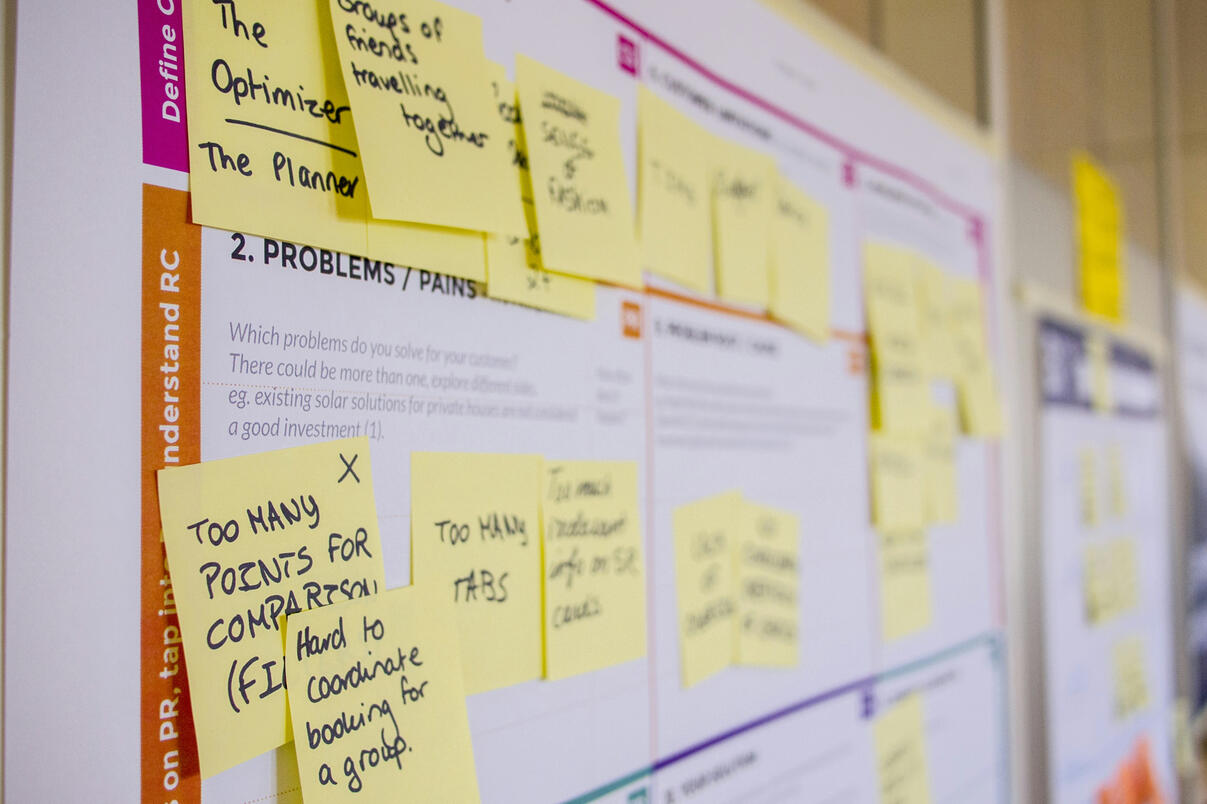
Start-up your PhD
Eine Doktorarbeit ist ein Mammutprojekt und kann am Anfang überfordernd sein.
Wie teilt man das immense Arbeitspensum in überschaubare Aufgaben und Etappenziele auf? Wie verwaltet man die verfügbare Zeit und vorhandene Ressourcen, damit man rechtzeitig fertig wird und gesund bleibt? Was tun, wenn etwas schief läuft?
All das lernen Promovierende in diesem eintägigen Workshop. Damit aus dem Mammut- ein Erfolgsprojekt wird.

Your Pathway to Impact
Von uns Wissenschaftlern wird zunehmend erwartet, dass unsere Forschung Impact hat.
Aber was bedeutet das überhaupt? Und wo können wir uns engagieren und einen Beitrag zur Gesellschaft leisten?
In diesem praxisorientierten eintägigen Workshop entwickeln Teilnehmende ihren persönlichen Weg zu mehr Impact. Von der Ideenfindung über das Verständnis ihrer Zielgruppe bis hin zum ersten Handlungsschritt.

Networking for ECRs
Im digitalen Zeitalter ist es für Forschende entscheidend, online sichtbar zu sein, um ihre Forschung zu verbreiten, mit Kollegen zusammenzuarbeiten und ihre Karriere voranzutreiben.
Dieser 2-tägige Workshop vermittelt Teilnehmenden die notwendigen Fähigkeiten, um ihr berufliches Netzwerk aufzubauen, zu erweitern und zu nutzen - sowohl persönlich als auch auf Social Media.

Scientific Presentations - Getting your message across
Die beste Forschung kann nichts bewirken, wenn niemand von ihr erfährt. Dieser interaktive Workshop vermittelt die wesentlichen Skills und Techniken für überzeugende, klare und wirkungsvolle Präsentationen.
Die Teilnehmer lernen, wie sie ihre Inhalte strukturieren, mit Daten eine Geschichte erzählen, ansprechende Bilder entwerfen und ihre Botschaft selbstbewusst vermitteln können an Kollegen und Forschende aus anderen Disziplinen vermitteln können.
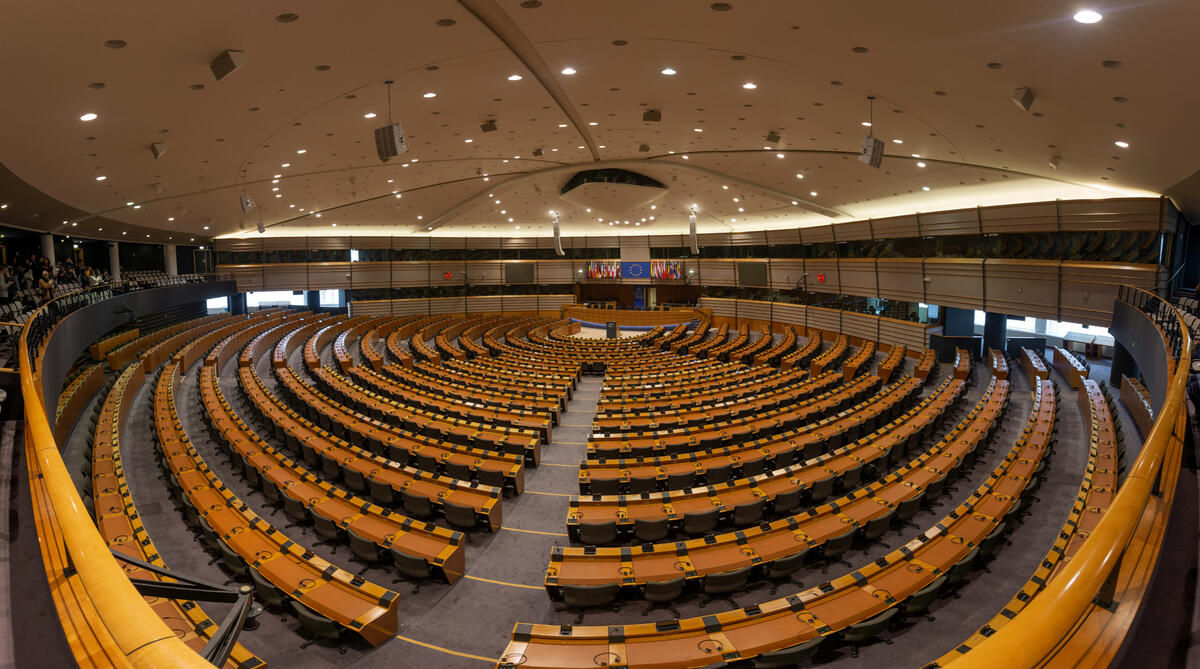
How to write a policy brief
In diesem Workshop erfahren die Doktorand*innen, wie sie ihre Forschung in politische Prozesse einbringen können.Die Teilnehmenden verfassen ihr eigenes Policy Brief und lernen dabei, Kernaussagen ihrer Forschung herauszufiltern und politische Empfehlungen zu entwickeln und ihre Botschaft so zu transportieren, dass sie relevante Zielgruppen in Politik und Gesellschaft erreicht.
Ph*ing Do it!
Vielen Doktoranden fällt es schwer, ihre Dissertation abzuschließen. Aber das muss nicht sein! Eigentlich braucht es nur 3 Dinge:
- Ein klares Ziel
- Einen Plan für den Endspurt
- Ein Team von Unterstützer*innen.
Die 90-Tage Online-Challenge Ph*ing Do it! bietet, all das.
- 1 intensive Kick-off-Woche
- Wöchentliche Check-ins.
- Einzelcoaching bei Bedarf
(Für mehr Infos auf Bild klicken)
Mehr Info?
Stimmen von Teilnehmenden
"I really enjoyed the workshop Andrea. I particularly liked the room you gave us to discuss and interact. I like the structured sheet that we could fill in during the course. I think everything was well structured and educational of what it needs to make an impact."
"I have done several other similar courses on management in the past, but I still learnt some new, useful tips."
"Much enjoyed. Thought-provoking, engaging, and lots of useful information provided."
"Extremely effective!"
Referenzen




Get in Touch!
Über mich
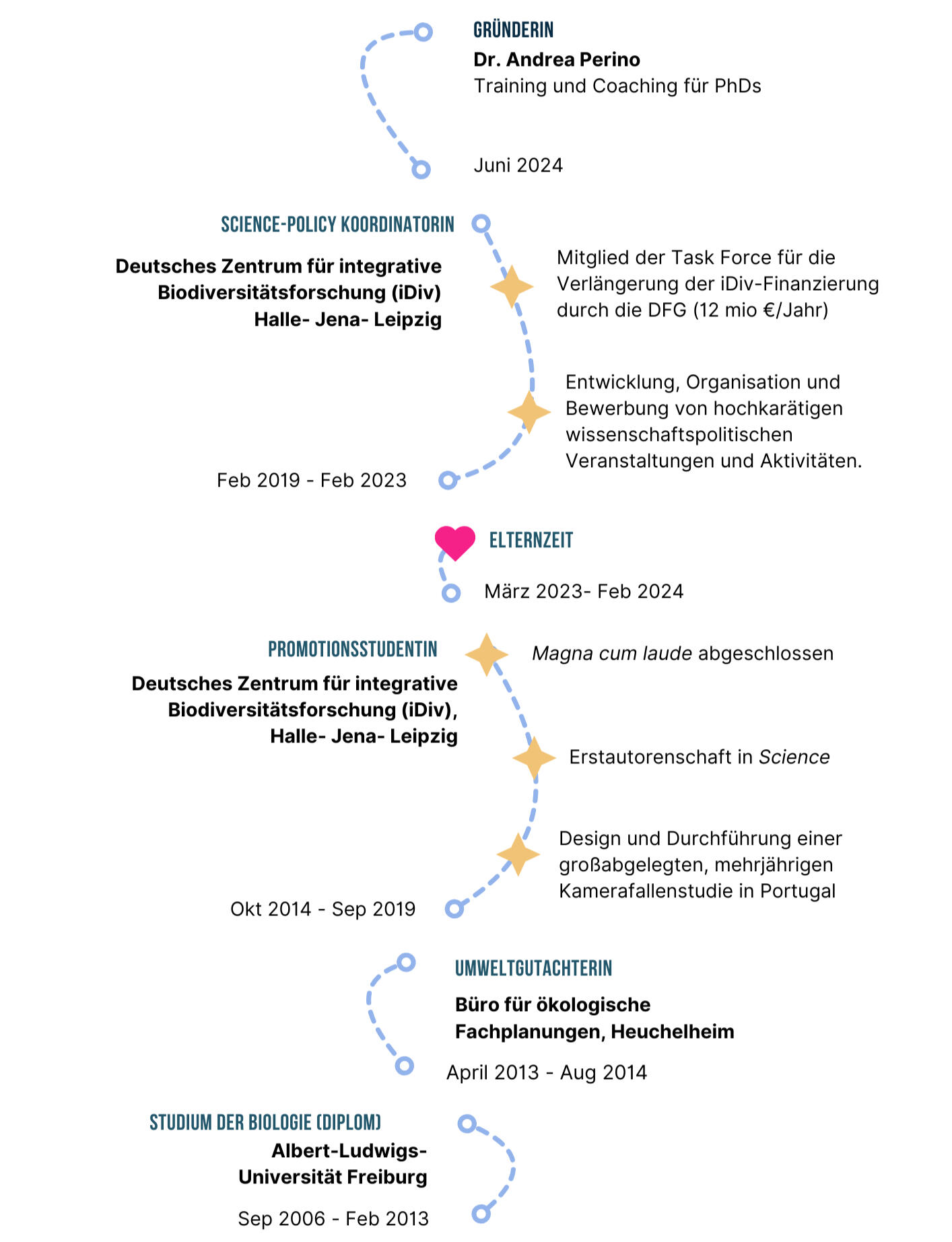
Ich habe 2019 an der Martin-Luther-Universität Halle-Wittenberg im Bereich Naturschutzökologie promoviert.
Meine Forschung wurde in hochrangigen disziplinären und interdisziplinären Fachzeitschriften wie Science und Conservation Letters veröffentlicht und von zahlreichen Medien (z.B. BBC, WDR, Süddeutsche Zeitung, ARTE) gefeatured.Von 2019 bis 2024 war ich als Koordinatorin für Wissenschaft und Politik am Deutschen Zentrums für Integrative Biodiversitätsforschung (iDiv) in Leipzig tätig. In dieser Funktion vertrat ich iDiv in globalen biodiversitätspolitischen Prozessen, entwickelte und leitete die institutsweite Science-Policy Strategie, beriet Bundes- und Landesregierungen, plante und organisierte hochrangige politische Großveranstaltungen und unterstützte Wissenschaftlerinnen und Wissenschaftler bei der Präsentation ihrer Forschung vor einem wissenschaftlichen und nicht-wissenschaftlichen Publikum.Seit 2021 bin ich von der Coach Training Alliance (CTA) als Coach zertifiziert.Im Juni 2024 habe ich Dr. Andrea Perino - PhD Coaching and Training gegründet.


